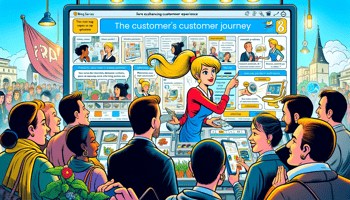They told you automation would help your CPQ team. They didn’t tell you it might eliminate the need...
Why Quote Speed Matters More Than You Think
If your quote takes longer than a coffee break, you’re already behind.
Speed isn't just a sales efficiency metric anymore — it’s a competitive advantage. And in manufacturing sales, where complex configurations and pricing approvals slow everything down, quote speed is often the difference between winning the deal or not even being considered. Still, many companies continue to treat quoting like paperwork: something to be carefully assembled, routed, reviewed, and eventually delivered.
This blog post argues that slow quotes are costing you real money — and that modern CPQ systems, powered by automation and AI, are changing the game. If your quoting process still involves spreadsheet gymnastics and email threads, it’s time to rethink.
The Real Cost of a Slow Quote
Every day a quote sits in your pipeline is a day the customer could be moving forward with a competitor. It’s also a day your sales rep spends chasing approvals, clarifying specs, or manually formatting documents — instead of selling.
Here’s what a slow quoting process actually means:
-
Lost deals: Buyers often move forward with whoever sends the first clear quote. Being second (or third) rarely wins.
-
Lower margins: Longer sales cycles invite more negotiation and discounting, especially when urgency fades.
-
Wasted time: Sales teams stuck in back-and-forth with engineering, finance, or legal lose valuable hours.
-
Internal friction: The longer a quote takes, the more people get involved — increasing risk for errors and inconsistencies.
And yet, many companies tolerate quote turnaround times of days or even weeks. Why? Because they assume complexity is an excuse for slowness.
It’s not.
What Fast Quotes Actually Require
Fast quotes don’t come from working harder. They come from systems that eliminate bottlenecks — and from teams that trust those systems to make good decisions. In our CPQ projects, we’ve found that the companies who quote fast have these common traits:
-
Rule-based product logic: Valid configurations are enforced automatically (no engineer sign-off needed).
-
Guardrail pricing: Discount limits and margin floors are built into the pricing model — so approvals aren’t needed for every deal.
-
Predefined document templates: Proposals are automatically generated with the right specs, terms, and customer details.
-
Integrated data: The system knows what products are available, what the pricing is, and what the customer already has — without needing to dig.
Tacton CPQ is a perfect example of this. Its constraint-based configuration ensures every quote is valid from the start. Pricing logic enforces profitability. Proposal generation tools handle the paperwork. And with AI enhancements, the system can even suggest the optimal configuration or discount level — saving reps from guesswork.
How AI Makes Fast Quoting Smarter
AI takes quoting speed to the next level by not just accelerating the process — but improving it. Here’s how:
-
Predictive configuration: Based on previous deals and customer preferences, AI can recommend a full solution in seconds.
-
Dynamic pricing: The system suggests pricing optimized for margin and win probability — no manual lookup needed.
-
Auto-approvals: If a quote meets defined conditions, it’s auto-approved — no manager delay.
-
Quote versioning and reuse: AI tracks patterns and can suggest reusing similar quotes for similar deals.
The outcome? What used to take 3–5 days can be done in 30 minutes. And with far less risk of error or rework.
Real-World Wins: Speed That Pays Off
One cpq.se client — a global manufacturer in the heavy equipment space — cut quote generation time from 4 days to under 2 hours. They didn’t add more staff. They streamlined the quote process using Tacton CPQ, standardized configurations, and simplified the approval flow.
Another example is HMF, a company building sophisticated cranes. With CPQ in place, they no longer have to wait for engineering reviews for every quote. The system already knows what’s valid — and quotes go out much faster, with higher accuracy and confidence.
This isn’t just about tools — it’s about designing your process for flow instead of checks.
Ready to Compete? Quote Like It.
If you’re losing deals to faster competitors, don’t blame your product. Blame your quote cycle.
Take a hard look at how long it takes to get from “customer request” to “customer quote.” Then ask:
-
Which parts could be automated?
-
Which approvals add no real value?
-
Are my salespeople spending more time formatting than selling?
You don’t need to cut corners — you just need to cut friction. That’s what modern CPQ, especially with AI, is built to do.
Want help analyzing where your quote process can speed up without losing control? Our CPQ Analysis Workshop is designed for that. We help manufacturing companies map their process and spot the delays — and then build a plan for quoting better, not just faster.
Or let’s grab a virtual coffee — Magnus and Patrik are happy to talk through what your quoting process could look like with the right setup.




